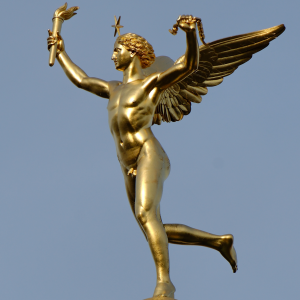Staring at my computer screen, I blink. The black cursor, a vertical slit of a pupil, blinks back.

Uh-oh. I am trying to write the first essay for my environmental nonfiction class. But, sitting down to write, I can already feel the despondent haze of writer’s block descending. I swivel in my chair. I check my email but have no new messages. I type fdsajkl; on the first line of the page, and then delete it. What’s wrong with me? I think. Am I a writer or not?
The prospect of finding and channeling creative brilliance can be maddening. The harder we look for inspiration, the more it eludes us. If we don’t find creative insight, we feel demoralized. In a cycle of fear and insecurity, the creator’s block feeds itself.
Creative insight fuels innovative art, research, entrepreneurship, communication, and problem-solving. I’ve felt its touch while brainstorming research questions and even when finding an unexpected solution to a calculus problem. More frequently, I’ve felt a lack of creative insight in these same situations. This is far from the first time I’ve stared down a blank Word document.

Last week, I watched a TED talk by Elizabeth Gilbert, author of the 2006 bestseller Eat, Pray, Love. The book’s aftermath posed an intimidating challenge for Gilbert, who worried that her subsequent novels would never live up to its success.
Gilbert is intimidated by the prospect of channeling genius onto the page. Creativity, she says, doesn’t usually work like this. It isn’t that we are genius – as though creative brilliance is something a human can permanently possess and command at will. Instead, we are visited by creative genius – a wild, benevolent spirit that comes and goes as it fancies. In its original Latin, Gilbert points out, genius is actually a guardian spirit. Here, creative genius is something we channel, rather than something we are or are not.
In its original Latin, Gilbert points out, genius is actually a guardian spirit. Here, creative genius is something we channel, rather than something we are or are not.

There are things we can do to invite our own imps to visit. I’ve learned that my creative imp is a reticent one, shy of music and multitasking. She emerges to visit only when she finds me alone, still, and with a pencil in hand. During a poetry blitz last April, I found that sitting on my windowsill works particularly well.
One of my friends has a restless imp, who visits mostly when she is on the move. She says she has thought of her best journalistic story ideas while running or biking outside.
Elizabeth Gilbert likens her creative process to a mule at work, sweating and straining at the hard daily labor of writing. I like this image of creativity as a craft of dedication and hard work. The imp of genius, should it come, is an unpredictable, temporary visitor. All we can do is open the door, give our best work, and be grateful if inspiration drops by.
I’ve found it’s easier to start writing once I’ve released myself from the pressure to be creative. Paradoxically, I also find creativity comes more easily without this pressure, and that viewing creativity as a force outside myself has made me more aware of my creative process and the ways I can invite insight.
And so I return to the Word document and start typing. I give my attention over to the ideas, the language, and the unfolding essay. I leave one hopeful ear open for the sound of tiny footsteps at the door.
— Zoe Sims, Natural Sciences Correspondent

